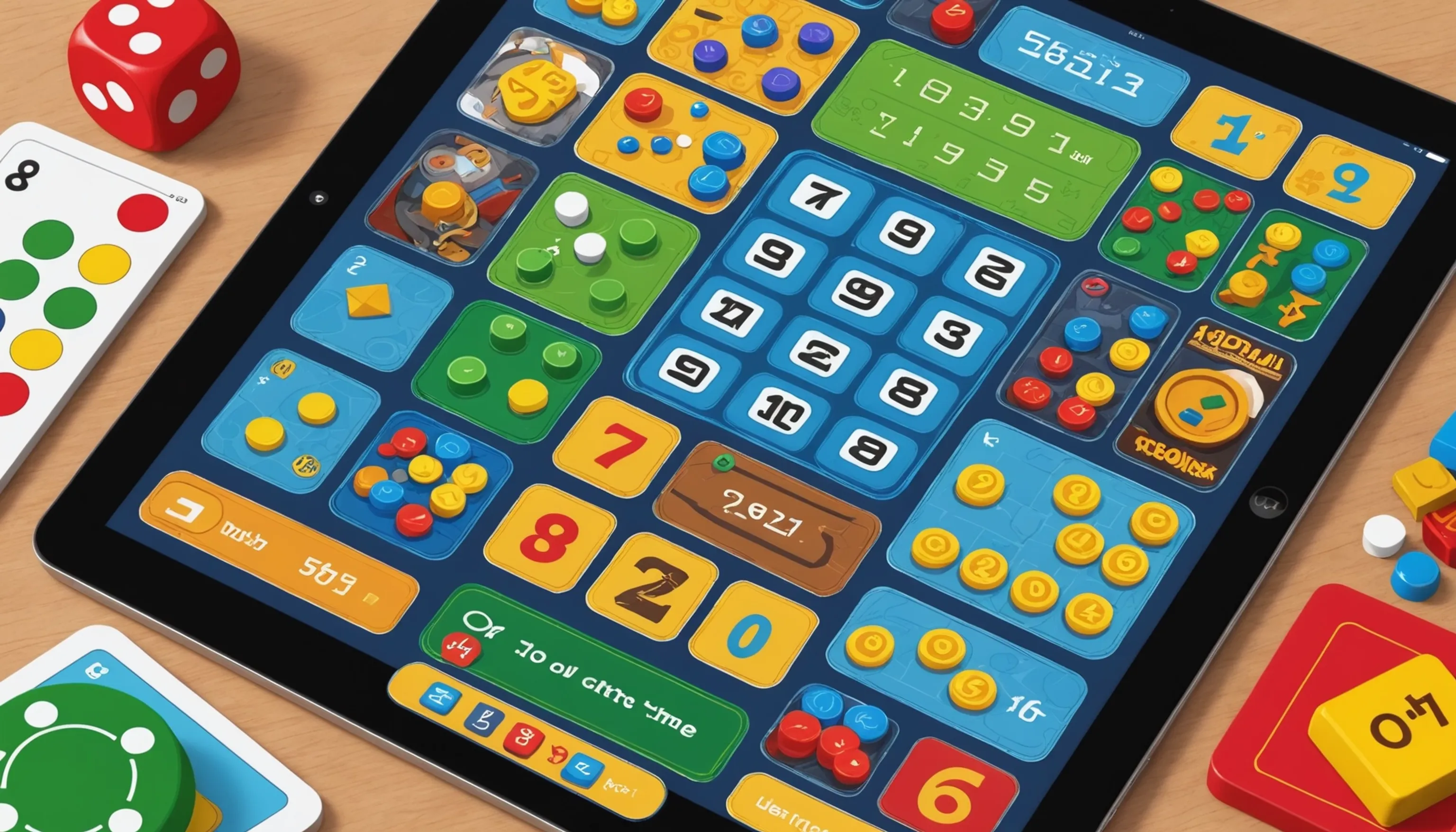Games to Increase Interest in Math
 HvWHenry van Wagenberg
HvWHenry van Wagenberg
Games to Increase Interest in Math for Teens
Engaging teens in math can be challenging, but using games can significantly boost their interest. Math games create an interactive environment that encourages learning through fun and competition. These games help students develop critical thinking and problem-solving skills while making math enjoyable.
Popular options include board games, online platforms, and mobile apps, each tailored to various skill levels. By integrating games into daily learning, parents and teachers can foster a love for math that extends beyond the classroom. Ultimately, games serve as a bridge to enhance students' mathematical understanding and confidence.
Benefits of Using Games to Teach Math
Using games to teach math offers numerous benefits that can significantly enhance students' learning experiences. One of the primary advantages is that games create a fun and engaging atmosphere, which can make even the most complex mathematical concepts more accessible. When teens enjoy the process of learning, they are more likely to participate actively and retain information.
Additionally, games encourage collaboration and teamwork. Many math games require players to work together to solve problems or achieve goals, fostering important social skills. This collaborative environment not only enhances communication but also allows students to learn from each other, promoting a deeper understanding of mathematical concepts.
Moreover, games can help develop critical thinking and problem-solving skills. Many math games present challenges that require strategic planning and logical reasoning, encouraging players to think critically about the best ways to approach a problem. This active participation in the learning process leads to improved analytical skills.
Another significant benefit is the ability to tailor learning experiences to individual students’ needs. Games can be adapted to suit different skill levels, ensuring that all students can participate and benefit from the learning experience. Whether through board games, online platforms, or mobile apps, the versatility of math games allows for personalized learning paths.
Ultimately, incorporating games into math education not only increases interest but also fosters a positive attitude toward mathematics, setting the stage for lifelong learning.

Types of Math Games for Teenagers
There are several types of math games that can effectively engage teenagers and enhance their mathematical skills. Board games, such as Monopoly or Prime Climb, combine fun with math concepts like budgeting and prime numbers. Online math games, like Prodigy and Kahoot!, offer interactive experiences that challenge students while allowing for competition with peers.
Additionally, mobile apps such as Mathway and DragonBox provide on-the-go learning opportunities, making math practice more convenient. Puzzle games and escape room challenges that incorporate math problems also promote critical thinking.
Board Games That Make Math Fun
Board games can be a fantastic way to make math fun for teenagers. They combine strategic thinking with mathematical concepts, making learning enjoyable and interactive. Here are some popular board games that effectively integrate math into gameplay.
One of the most well-known games is Monopoly, where players buy, trade, and manage properties. This game teaches essential concepts like addition, subtraction, and budgeting as players calculate their expenses and profits. Another great option is Prime Climb, a colorful board game that focuses on prime numbers and mathematical operations, helping players improve their arithmetic skills.
Sum Swamp is also an excellent choice for younger teens, where players navigate through a swamp while solving addition and subtraction problems. This game emphasizes mental math in a fun, engaging way.
For those looking for a more strategy-based game, Settlers of Catan requires players to gather resources and make calculated trades, reinforcing concepts like ratios and probability. Additionally, Math Dice challenges players to use math skills to reach target numbers, promoting quick thinking and problem-solving.
These board games not only make math enjoyable but also encourage social interaction, critical thinking, and teamwork. By incorporating these games into family game nights or classroom activities, parents and teachers can foster a positive attitude toward math while helping teens develop essential skills.

Online Math Games for Interactive Learning
Online math games have revolutionized the way teenagers engage with mathematics, providing an interactive learning experience that keeps them motivated and excited. These digital platforms offer a variety of games designed to reinforce mathematical concepts while making learning fun.
One popular online math game is Prodigy, which combines role-playing elements with math challenges. Players embark on quests and tackle math problems tailored to their skill levels, allowing them to progress at their own pace while reinforcing essential concepts. This adaptive learning approach not only builds confidence but also helps students master math skills.
Another excellent option is Cool Math Games, a website featuring a wide range of math-based games that cover topics from basic arithmetic to advanced algebra. The games are designed to be entertaining, with engaging graphics and gameplay that encourages students to think critically and strategically.
Additionally, platforms like Kahoot! allow teachers to create interactive quizzes that can be played in a competitive format. This gamified approach makes math review sessions more exciting, as students can compete against their peers in real-time.
Lastly, Math Playground offers a variety of math games, puzzles, and logic challenges that promote problem-solving skills. By incorporating these online math games into study routines, parents and teachers can make math learning more dynamic and effective, ultimately helping teens develop a positive relationship with the subject.
Mobile Apps to Engage Teens in Math
Mobile apps have become an essential tool for engaging teenagers in math, providing convenient access to interactive learning resources anytime and anywhere. These apps not only make math practice more accessible but also incorporate gamification elements that motivate students to improve their skills.
One of the standout apps is Photomath, which allows students to take pictures of handwritten or printed math problems and receive step-by-step solutions. This app encourages self-learning and helps students understand the processes behind solving various mathematical equations.
Another popular choice is DragonBox, a series of apps designed to teach algebraic concepts through engaging gameplay. The game mechanics are intuitive and visually appealing, allowing teens to grasp complex ideas without feeling overwhelmed. By playing these games, students can develop a solid foundation in algebra while having fun.
Khan Academy Kids is also worth mentioning, as it offers a comprehensive math curriculum tailored for younger audiences. With interactive lessons and activities, this app adapts to each student's learning pace, making it an excellent resource for personalized math practice.
Additionally, Mathway provides instant homework help by allowing students to input problems and receive solutions and explanations. This app serves as a valuable study aid, especially during exam preparation. By incorporating these mobile apps into their daily routines, teens can enhance their math skills while enjoying a flexible and engaging learning experience.
Tips for Parents and Teachers to Encourage Math Play
Encouraging math play among teenagers can significantly enhance their interest and understanding of the subject. Here are some effective tips for parents and teachers:
- Incorporate games: Use board games, online platforms, and mobile apps that focus on math concepts to make learning enjoyable.
- Create a math-friendly environment: Surround teens with math-related resources, such as books, puzzles, and educational tools.
- Set challenges: Organize friendly competitions or math challenges to spark excitement.
- Be positive: Foster a supportive atmosphere where mistakes are seen as learning opportunities.
These strategies can help cultivate a love for math.
Creating a Math-Friendly Environment at Home
Creating a math-friendly environment at home is essential for fostering a positive attitude towards math among teenagers. By incorporating math into daily life, parents can help their children develop essential skills while making learning enjoyable.
One effective strategy is to integrate math into everyday activities. For example, involve teens in cooking by having them measure ingredients, calculate cooking times, or adjust recipes. This not only reinforces basic arithmetic but also demonstrates the practical applications of math in real life.
Another approach is to set up a designated study area that is free from distractions. This space should be equipped with necessary supplies, such as calculators, notebooks, and math-related resources like textbooks or educational games. A well-organized study environment can enhance focus and motivation.
Additionally, consider incorporating math games into family game nights. Board games like Monopoly or digital games like Kahoot! can make math fun and engaging. Encourage friendly competition to keep the atmosphere light and enjoyable.
Moreover, displaying math-related posters or engaging puzzles around the home can create a stimulating environment. Encourage discussions about math in everyday contexts, such as budgeting, shopping, or planning trips, to reinforce its relevance.
Finally, celebrate achievements, no matter how small. Recognizing progress can boost confidence and motivate teens to embrace math challenges. By fostering a math-friendly environment, parents can help their teenagers develop a lasting appreciation for the subject.
Incorporating Math Games into Classroom Activities
Incorporating math games into classroom activities can significantly enhance student engagement and understanding of mathematical concepts. By making learning interactive and enjoyable, teachers can foster a positive attitude toward math among teenagers.
One effective strategy is to integrate math games into daily lessons. For instance, start a class with a quick math warm-up game that focuses on the concepts being taught that day. Games like Kahoot! or Quizizz allow students to compete in a fun quiz format, reinforcing their knowledge while promoting healthy competition.
Additionally, consider using group-based math games to encourage collaboration. Activities like math relays or scavenger hunts require students to work in teams to solve problems or find answers, promoting teamwork and communication skills. These collaborative games not only make math more enjoyable but also help students learn from one another.
Teachers can also utilize board games and card games that focus on mathematical concepts. Games like Sum Swamp or Prime Climb can be integrated into math centers, allowing students to rotate and engage with different games throughout the week.
Furthermore, incorporating technology can enhance the gaming experience. Online platforms like Prodigy offer adaptive learning games that cater to individual student needs. By integrating these tools into classroom activities, teachers can provide personalized learning experiences.
Ultimately, incorporating math games into classroom activities creates an engaging learning environment that encourages students to embrace math with enthusiasm and curiosity.
